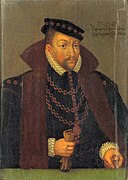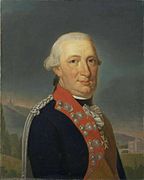Swiss troops in the service of the Electorate of the Palatinate
The one Swiss troops in Palatine services , by the electors of the County Palatine of the Rhine several times removed and rebuilt, was a Swiss Life Guards.
Swiss troops in foreign service was the name of the paid service of commanded, whole troop bodies abroad, regulated by the authorities of the Swiss Confederation by international treaties .
These treaties contained a chapter regulating military affairs: the so-called surrender (or private surrender if one of the contracting parties was a private military contractor).
Overview of the Swiss troops in the Electoral Palatinate service
| Wittelsbach House | ||
| # short | designation | year |
| Elector Johann Casimir 1583–1592 | ||
| 1 | Swiss bodyguard | 1592 |
| Elector Karl Ludwig 1649–1680 | ||
| 2 | Swiss bodyguard | 1656 -? / 1678–? |
| Elector Karl Philipp 1716–1742 | ||
| 3 | Swiss bodyguard | 1716-1778 |
| Elector Karl Theodor 1742–1799 1777 Elector of the Palatinate-Bavarian Elector |
||
|
|
||
| House of Hessen | ||
| 0 |
Swiss bodyguard without federal reference |
1778-1866 |
The Electoral Palatinate, a territorial patchwork quilt

The Count Palatine near Rhine was one of the (originally) seven electors of the Holy Roman Empire of the German Nation .
The electoral Rhineland Palatinate (short form: Electoral Palatinate ) was not a coherent territory, but a constantly changing territorial patchwork of individual areas. Roughly speaking, it extended from the Moselle on the left side of the Rhine up to northern Alsace and on the right side of the Rhine past Heidelberg along the Neckar to the Heilbronn area. He was held together by the office of the Count Palatine, who was formerly responsible for the royal Palatinate and who finally became elector with the Golden Bull of 1356.
The office of the elector palatine was often transferred from one dying high aristocratic dynasty to the next, and ultimately between different lines of the Wittelsbach family . The Electoral Palatinate changed its denomination several times between Catholicism, Lutheranism and Calvinism and has also been occupied by Spanish, Swedish, Bavarian or French generals.
As early as the 16th century, Elector Johann Kasimir received a Swiss bodyguard from the Protestant federal cities.
| Name, duration of use |
(1 short ) Swiss Life Guard 1582 | ||||||||||||||||||||||
| Year, contractual partner |
1582: Elector Johann Kasimir surrendered to the Protestant federal cities. | ||||||||||||||||||||||
| Stock, formation |
A company of 200 men, 40 of them from Zurich. | ||||||||||||||||||||||
| Origin squad, troop |
From the Protestant cantons. | ||||||||||||||||||||||
| Owner, commander, namesake |
|
||||||||||||||||||||||
| Use, events |
The unit seems to have been dissolved again after the death of Elector Johann-Kasimir. | ||||||||||||||||||||||
The Swiss immigrants to the Electoral Palatinate
The Electoral Palatinate suffered particularly badly from the atrocities of war and pillage during the Thirty Years' War : entire areas were swept empty. The country with the residential city of Heidelberg suffered from depopulation and finally passed an immigration law. From 1650 onwards, the population down the Rhine was supposed to be renewed, especially by immigrants from the German-speaking cantons of war-spared Switzerland, and crafts were to be promoted. The offer was welcomed by the economic downturn in the Confederation after the end of the war.
Elector Karl Ludwig also bought a Swiss bodyguard in 1656, made up of confederates known for their reliability and military skills.
| Name, duration of use |
(2 short ) Swiss Life Guard 1656 -? / 1678–? | ||||||||||||||||||||||
| Year, contractual partner |
1656/1678: Authorization for Elector Karl Ludwig from Zurich. | ||||||||||||||||||||||
| Stock, formation |
|
||||||||||||||||||||||
| Origin squad, troop |
From Zurich. | ||||||||||||||||||||||
| Owner, commander, namesake |
|
||||||||||||||||||||||
| Use, events |
Whether it is the same or two different units and their duration of use is not clear from the available sources. | ||||||||||||||||||||||
The Electoral Palatinate opens up in Bavaria
A century later, Elector Karl Philipp's army in the Electorate of the Palatinate had a Swiss guard.
In 1777, shortly before the French Revolution , the Bavarian, the main Wittelsbach line, died out in the male line. The elector of the Palatinate near Rhine from the Sulzbach branch line, Karl Theodor , took over the inheritance, brought the Electoral Palatinate into the newly formed state of Electoral Palatinate Bavaria and moved the capital from Mannheim to Munich.
During this process, the Electorate of the Palatinate became extinct. Karl Theodor, however, continued the Bavarian electorate.
He also united both armies to form the Electoral Palatinate-Bavarian Army. The Electoral Palatinate Swiss Leib-Guard was dissolved and integrated into existing Bavarian associations.
| Name, duration of use |
(3 short days ) Swiss bodyguard 1716–1778 | ||||||||||||||||||||||
| Year, contractual partner |
Decree from Elector Karl Philipp ? | ||||||||||||||||||||||
| Stock, formation |
1 captain en chef, general; 1 lieutenant, colonel; 1 ensign, lieutenant colonel; 4 captains exempts; Majors (these all of nobility); 1 quartermaster; Captain; 1 field shearer; 2 constables; 3 corporals; 2 reels; 2 Pfeiffer; 46 Swiss; 1 Profos; together 66 men. |
||||||||||||||||||||||
| Origin squad, troop |
Officer corps mainly from the Electoral Palatinate. | ||||||||||||||||||||||
| Owner, commander, namesake |
1775: Capitaine en Chef: Friedrich Wilhelm , Prince of Isenburg; Colonel: Carl Joseph , Count von Wiser. | ||||||||||||||||||||||
| Use, events |
After the union of the Electoral Palatinate with Bavaria in 1777, the remnants of the unit went into existing Bavarian guards. | ||||||||||||||||||||||
The end of the Electoral Palatinate through Napoleon
United with Bavaria in 1777, the Napoleonic Wars in 1803 marked the final end for the Electoral Palatinate.
The Reichsdeputationshauptschluss over left, as for other German princes, their left bank of the Rhine and France shared the right bank majority owned by the Electorate of Baden to.
To compensate for the loss of territory on the left bank of the Rhine, four new electoral dignities were created, including that of Hessen-Kassel (short form: Kurhessen ).
The last electoral, an electoral Hessian Swiss bodyguard
These Hesse-Kassel landgraves, and from 1803 electors, also had a Swiss bodyguard in their armed forces, which, however, had no relation to Swiss citizenship.
This, although not an electoral Palatinate, federal but rather an electoral Hessian unit, is also listed below, for the sake of completeness, as the last electoral Swiss bodyguard .
| Name, duration of use |
(0 short ) Swiss bodyguard 1778–1866 without federal reference |
|
|||||||||||||||||||||||||||||||||||||||||||||
| Year, contractual partner |
Decree of Landgrave Friedrich II. |
||||||||||||||||||||||||||||||||||||||||||||||
| Stock, formation |
1 captain or captain, 1 first lieutenant, 1 subordinate, 1 sergeant or sergeant, 1 fourier, 2 sergents, 2 sergeants, 4 corporals, 8 privates.
|
||||||||||||||||||||||||||||||||||||||||||||||
| Origin squad, troop |
particularly suitable veterans from disbanded native guards. | ||||||||||||||||||||||||||||||||||||||||||||||
| Owner, commander, namesake |
From the Hessian military aristocracy. | ||||||||||||||||||||||||||||||||||||||||||||||
| Use, events |
The task of the unit consisted, in addition to the representation at state events, in the guarding of the Löwenburg and the electoral palaces.
Landgrave Friedrich II. And his landgrave and electoral successors formed the Swiss body guard several times and also changed its name several times. |
||||||||||||||||||||||||||||||||||||||||||||||
Remarks
- ^ The Protestant federal cities were Zurich, Bern, Basel and Schaffhausen.
- ↑ The dukes of Bavaria (1623) and Braunschweig-Lüneburg (1692) had also achieved the (8th and 9th) electoral dignity in the 17th century.
- ↑ When the electoral dignities were created ( Salzburg , Württemberg , Baden and Hessen-Kassel ), the two clergy from Trier and Cologne were abolished.
- ↑ the successor of Landgrave Friedrich II. , The founder of Hesse-Kassel rule Swiss Guards was Landgraf Wilhelm I. He became in 1803 the first Kurhessischer elector.
- ↑ This is an example of the use of the word Swiss as a synonym for a princely / royal guard soldier .
- ↑ One of the richest princes in Europe through soldier trade on a large scale.
- ^ For example, Wilhelm I , who dissolved the Hessian army in 1806 and fled into exile from Napoleon . After his land was restituted in 1813, he returned and reorganized his armed forces.
bibliography
- Rudolf Haas, Hansjörg Probst: The Palatinate on the Rhine. 2000 years of national, cultural and economic history. Südwestdeutsche Verlagsanstalt, Mannheim 1984, ISBN 3-87804-159-4 .
- Alexander Schweickert: Electoral Palatinate. Kohlhammer, Stuttgart 1997, ISBN 3-17-014038-8 .
- Armin Kohnle : A short history of the Electoral Palatinate. G. Braun, Karlsruhe 2011 (4th edition), ISBN 978-3-7650-8329-7 .
- Volker Press : Calvinism and Territorial State. Government and central authorities of the Electoral Palatinate 1559–1619. Stuttgart 1970.
- Otto Bähr : The earlier Kurhessen - A history picture . Brunnemann, Kassel 1895.
- Karl Ernst Demandt : History of the State of Hesse . Bärenreiter, Kassel 1972, ISBN 3-7618-0404-0 .
- Ewald Grothe : Electorate . In: Kassel Lexicon . Edited by der Stadt Kassel, vol. 1. euregio, Kassel 2009, ISBN 978-3-933617-39-2 , pp. 360–362.
- Philipp Losch : History of the Electorate of Hesse. 1803-1866. Elwert, Marburg 1922; Reprint: Hamecher, Kassel 1972, ISBN 978-3-920307-07-7 .
See also
Web links
- Heidelberg Castle , Youtube video.
Individual evidence
- ↑ a b c Friedrich Vogel: The old chronicles or memorabilia of the city and landscape of Zurich from the oldest times up to 1820 , printed and published by Friedrich Schulthess, Zurich 1845. https://www.e-rara.ch/i3f/v20/ 8611740 / manifest .
- ↑ a b c d The Electoral Palatinate Army 1701-1777 . In: Friedrich Münich: History of the development of the Bavarian army in two centuries, Verlag Lindauer, Munich 1864. http://mdz-nbn-resolving.de/urn:nbn:de:bvb:12-bsb10387150-9 .
- ↑ The new Genealogical Reichs- und Staats-Hand-Buchs Auf das Jahr MDCCLXXV, second part, by Franz Varrentrapp, Frankfurt on Mayn 1775.
- ^ Felix Joseph Lipowsky: Karl Theodor, Elector of Palatinate-Bavaria, Duke of Jülich and Berg (et) c. (Etc. how he was, and how it is true, or his life and deeds , JE von Seidel'sche Buchhandlung, Sulzbach 1828.







